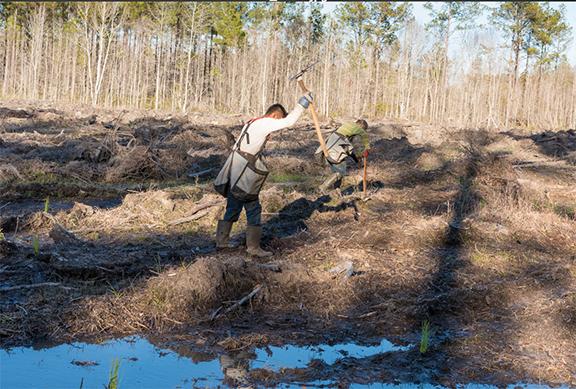National Recognition for Boeing's Environmental Leadership in South Carolina
Strategic partnerships help streamline permitting processes

National Recognition for Boeing's Environmental Leadership in South Carolina
A transformative wildlife protection initiative in South Carolina, spearheaded by Boeing in partnership with government and private sector agencies, has earned the highest level of conservation certification from the U.S. Wildlife Habitat Council (WHC) and is leading the way for similar efforts from other corporations in the state.
“This is Boeing’s first Gold level certification, an achievement that demonstrates our commitment to environmental stewardship,” said Boeing Enterprise Environment Director Steve Shestag. “Meeting the WHC’s strict certification requirements shows Boeing is an environmental leader by supporting sustainable ecosystems and the communities that surround them. Congratulations to the team in South Carolina on achieving this milestone and establishing a model process that other businesses can use to expand the acreage and pace at which lands are being protected.”
Boeing South Carolina’s wetlands mitigation plan, part of the site’s 2013 acquisition of 468 acres (192 hectares) of land from the state, was certified by WHC as a Gold tier project, the organization’s highest standard. The wetlands mitigation plan was necessary in order to permit the 468 acres for development, 153 (62 hectares) of which were wetlands that dated back to the property’s 19th century use as a phosphate mine.
Instead of purchasing mitigation credits as is the industry norm, Boeing partnered with several federal, state and local agencies and conservation organizations to identify three tracts of land near the Francis Marion National Forest for preservation. Boeing funded the purchase of these land tracts on behalf of The Nature Conservancy and Lowcountry Land Trust. This approach, which received approval from the U.S. Army Corps of Engineers in July 2014, has preserved approximately 4,000 acres (1,600 hectares) of land, including more than 2,000 acres (800 hectares) of wetlands.
The WHC Gold certification recognizes both the groundbreaking approach to wetlands mitigation as well as the work that has taken place since to restore the three tracts to their native state. Invasive and non-native species are being removed and prescribed burns at regular intervals are taking place to cull underbrush. Approximately 200,000 longleaf pine and hardwood trees were planted in 2017, and beginning in February work will start on planting more than 200,000 additional trees.
Notable progress is being made in the restoration and preservation of the three tracts, despite some uncontrollable hurdles. “We’re seeing positive results every year, even though we’ve had to overcome some weather-related challenges like the 1,000-year flood in 2015, Hurricane Matthew in 2016, and the recent snowstorm,” said Donna Crocker, BSC environmental engineer and a lead on the project. “The success of the model of land acquisition, preservation and enhancement is leading the way for other corporations to adopt this model for projects on their sites. This has been a fun project to work and I’ve learned a lot about forestry.”

